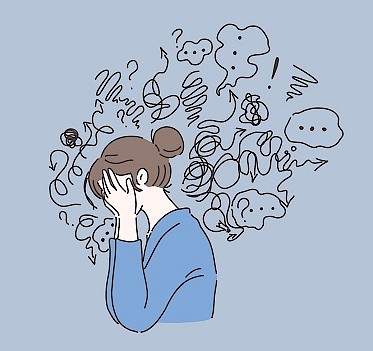Stop Stressing About Stress
April has been stress awareness month since 1992, created by the International Stress Management Association that was founded 20 years prior.
There have been numerous studies about what causes stress, the effects of it, stress related to a certain generation, and more. A study back in 2016 showed that 72% of adults feel the most stressed about money, 49% of adults experience a major stressful event each year, and 48% of adults say stress has a negative impact on both their professional and personal life. In 2017 studies showed that the most common reason for stress was the future of our nation, with violence/crime, and climate change following right behind.
Everyone needs a certain amount of stress to survive–it’s what helps motivate some of us to get out of bed in the morning. It gives us adrenaline to succeed in certain situations. However, stress can become a problem when our bodies experience too much of it, causing depression and anxiety, chronic headaches, stomach problems, and more.
If stress is left undealt with and shoved in the corners of your mind, it will ultimately affect not just your mental state, but also your physical state. Stress is inevitable in everyone’s life so there’s no point in stressing about stress. What you can do, though, is learn healthy ways to cope with what is stressing you out.
What does stress look like in the brain?
When your body detects stress, the brain reacts by stimulating the body to produce cortisol and adrenaline. These two hormones increase your heart rate, raise blood pressure, and increase energy for “fight or flight”. When your body recognizes it’s no longer in danger, your hormone levels fall, and your heart rate returns to normal. But more often than not, stress can leave you feeling anxious, angry, and scared. It’s estimated that 75-90% of all doctor visits are due to stress related complaints. There are two main categories of stress: acute and chronic. Acute stress is known as short-term whereas chronic stress is long-term.
| Acute Stress | Chronic Stress |
|---|---|
| Examples of acute stress would be unexpected events, car accidents, natural disasters, etc. Adrenal glands produce adrenaline and cortisol which can cause: | Examples of chronic stress would be a constant feeling of pressure or being overwhelmed over a long period of time. Chronic stress releases the same chemicals in the brain, but the results are more long term: |
|
|
| All of this results in energy increases and causes your muscles to tense up because they are on alert to act. | Chronic stress can also lead to ulcers, heart attack, heart failure, abnormal heartbeat, irritable bowel syndrome and more. |
10 Tips for Less Stress
-
Manage your time
If you have a long to-do list, then that in itself can be overwhelming. Narrow down your list by prioritizing what needs to be done that day and include “down time” in your to-do list. -
Prepare for the day
Take 10 minutes each evening to prepare for the next day, even if it’s just thinking about what you’re going to eat, wear, and things you need to get done. -
Enjoy the little things
Slow down and enjoy the moment you’re in by focusing on the details of everyday activities. -
Move often
Regular exercise reduces stress and improves health, but if you don’t have time to do a proper workout, standing up from your desk and stretching or taking a lap around the room can do wonders. -
Laugh often
Laughter releases endorphins that improve mood and immune system health. Take a moment to laugh, even if you have to force yourself to. -
Enjoy nature
Spending time outdoors is a natural antidepressant because natural scents and sights have a calming effect. Take a moment to acknowledge nature and the things you can’t control. -
Breathe Deeply
Slow breaths reduce stress hormones in the body and lowers the heart rate as well as blood pressure. Sometimes it’s ok if the only thing you did today was breathe. Give yourself a break. -
Meditate
Meditation is about finding inner peace. Oftentimes, people think of meditation as sitting cross legged, eyes closed, and repeatedly saying “ohmmmm” but it doesn’t have to be that specific. It can be something as easy as acknowledging exactly how you feel in the moment. Try to feel your fingertips from the inside to help bring awareness to your body. -
Keep a journal
Journaling promotes reflection and organization of thoughts. Journaling is an easy way to let go of things you are holding onto and there are no rules when it comes to journaling. -
Sleep well
This is a given, good sleep naturally puts you in a better mood and overall reduces stress.
HealthCARE Express Is Here for You
Taking control of your stress is easier said than done. Reducing your stress isn’t supposed to be stressful. If you need to take baby steps, then that’s ok too! Try moving your workspace in front of a window so you are getting enough sunlight throughout the day. Air out your room, office, or home so they don’t get stuffy and become an unhealthy environment. Even something as simple as tidying where you’re at will boost your mood and counteract the stress of clutter. You’re already taking the first step in reducing your stress levels by acknowledging what stress is and what too much of it can cause. At any of our HealthCARE Express locations we take you and your health seriously. We will do everything we can to help you be the healthiest version of yourself.
For more information about how you can take control of your stress, explore our website, visit us in person, or give us a call and we guarantee that your urgent care situation will be taken care of.
